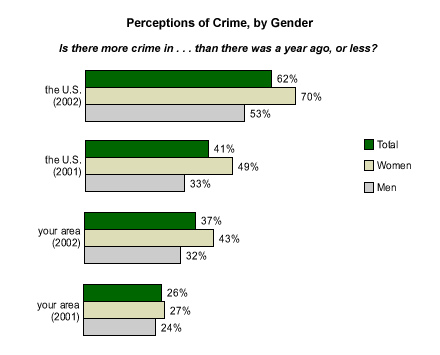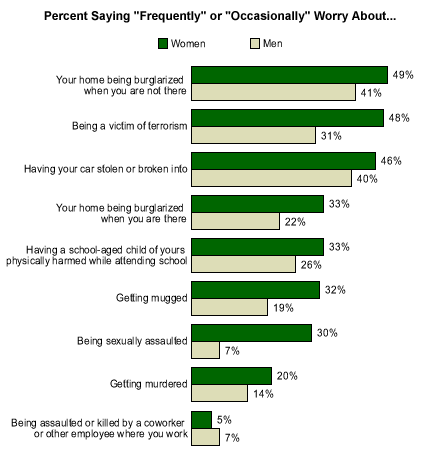Women significantly out-worry men on the issue of crime, according to an October 2002 Gallup Poll. Not only are women far more likely than men to perceive that there are higher rates of crime this year than last year, they are also more likely to worry that they personally will be victims of a crime. While women tend to worry more than men about most types of crime, they are especially more likely to worry about terrorism affecting them personally.
Perceptions of Increasing Crime
Between Sept.11, 2001, and the recent sniper attacks, Americans have been subject to particularly horrific acts of violence over the past 15 months. Gallup's research reveals that people are more likely to say there has been more crime in their area in the past year (37%) than they did last year at this time (26%). An even more dramatic difference is observed when people are asked whether there is more crime in the United States than there was a year ago: in 2002, 62% of people say there is more crime, while only 41% offered that response in 2001** (see "Public Sees Increase in Crime Nationally" in Related Items).
Some of the increase in perceptions of crime may be attributable to the fact that the string of Washington, D.C.-area sniper attacks was ongoing when Gallup conducted the 2002 poll. But one aspect of these results -- the difference between male and female responses -- did not change dramatically between 2001 and 2002. In both years, women were significantly more likely than men to say there is more crime now than there was one year ago. In 2002, 70% of women perceive there to be more crime nationwide now, compared to 53% of men. In 2001, 49% of women felt that crime had increased nationally, versus 33% of men.
However, whereas men and women shared roughly similar perceptions of crime in their local area a year ago (27% of women and 24% of men felt there was more crime), a notable gender gap emerged in 2002. Now, 43% of women say that crime in their local area has increased, compared to 32% of men.

Crimes of Greatest Concern
Women also worry more often than men about being victims of specific crimes. Women showed higher levels of worry than men with respect to eight out of nine crimes about which Gallup assessed Americans' levels of personal concern. (The ninth type of crime, "being assaulted or killed by a coworker or other employee where you work," registered sufficiently low levels of concern that the small gender difference is not notable.)
As expected, women are much more likely than men to worry at least occasionally about being the victim of sexual assault. Women are also far more likely to worry frequently or occasionally about getting mugged or having their home burglarized while they are at home. With respect to other types of crime -- including having a home burglarized while away from home, having a car stolen or broken into, having a child in physical danger at school, and getting murdered -- women are at least somewhat more likely than men to worry at least occasionally about being victimized.

But a dramatic difference also exists between men and women's levels of concern about being personally victimized by terrorism. Almost half of women (48%) worry at least occasionally about terrorism, as compared to 31% of men. The good news is that both men and women's concern about terrorism fell significantly over the past year. In October 2001, 55% of women worried at least occasionally about being victimized by terrorism, as did 37% of men.
Key Points
Only time will tell if the level of worry about terrorism will continue to decline over the years, but currently anxiety levels are particularly high among women -- one in two fears terrorist violence. Besides higher levels of concern about terrorism, almost one in three women worry at least occasionally about being a victim of sexual violence -- fears that may not be entirely unfounded, given that the U.S. violent crime rate is up for the first time since 1991. Amid the current climate of insecurity, it appears that women bear an especially heavy burden of anxiety regarding personal safety.
*Results are based on telephone interviews with 1,002 national adults, aged 18 and older, conducted Oct. 14-17, 2002. For results based on the total sample of national adults, one can say with 95% confidence that the maximum margin of sampling error is ±3%.
**Results are based on telephone interviews with 1,011 national adults, aged 18 and older, conducted Oct. 11-14, 2001. For results based on the total sample of national adults, one can say with 95% confidence that the margin of sampling error is ±3%.
